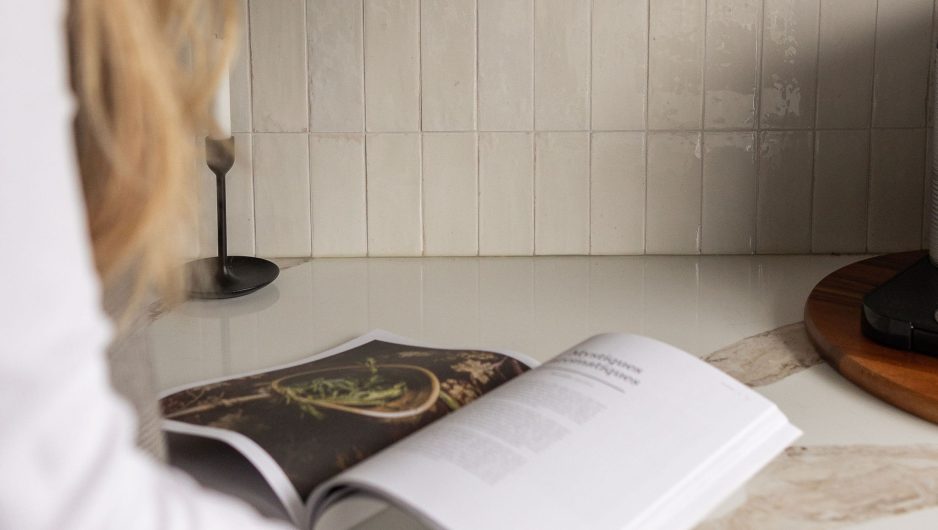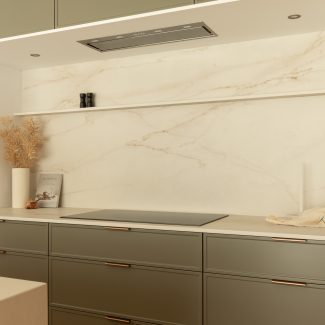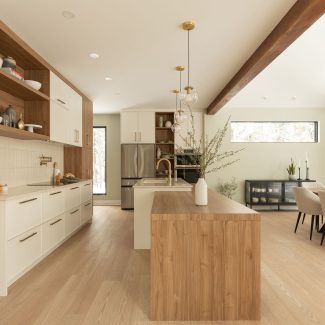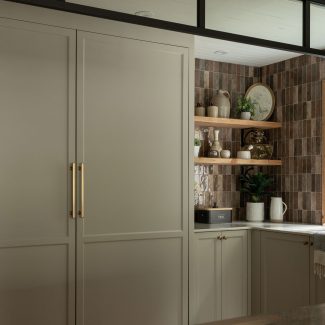Choosing your kitchen countertop is a major investment that can have a considerable impact on the design of your living space. Not only does it play a major utilitarian role, but it can also completely transform the aesthetics of your kitchen. With a wide range of coverings available on the market, it’s essential to ask yourself the right questions in order to compare the options available to you. So here’s our in-depth guide to help you choose the ideal kitchen countertop for your needs.
1. Define your budget
It’s crucial to set a realistic budget before you start your search, as this is often the most significant factor in your choice of countertop. The difference in price can be considerable, not only from one material to another, but also from one color to another. Generally speaking, stones such as granite, marble and quartz tend to be more expensive, while laminate and certain types of wood can make more affordable solutions.
Tip: Don’t hesitate to get quotes from several suppliers for your kitchen countertops-you might be surprised at the difference!
2. Set the kitchen style
Kitchen countertops can have a considerable impact on the overall aesthetics of the kitchen. Different materials offer a variety of colors, patterns and finishes that can complement different styles, whether you have a preference for contemporary, traditional, rustic or industrial. Consider the overall design of your kitchen to choose a countertop that complements other materials in the room, such as cabinet doors, flooring and backsplash.
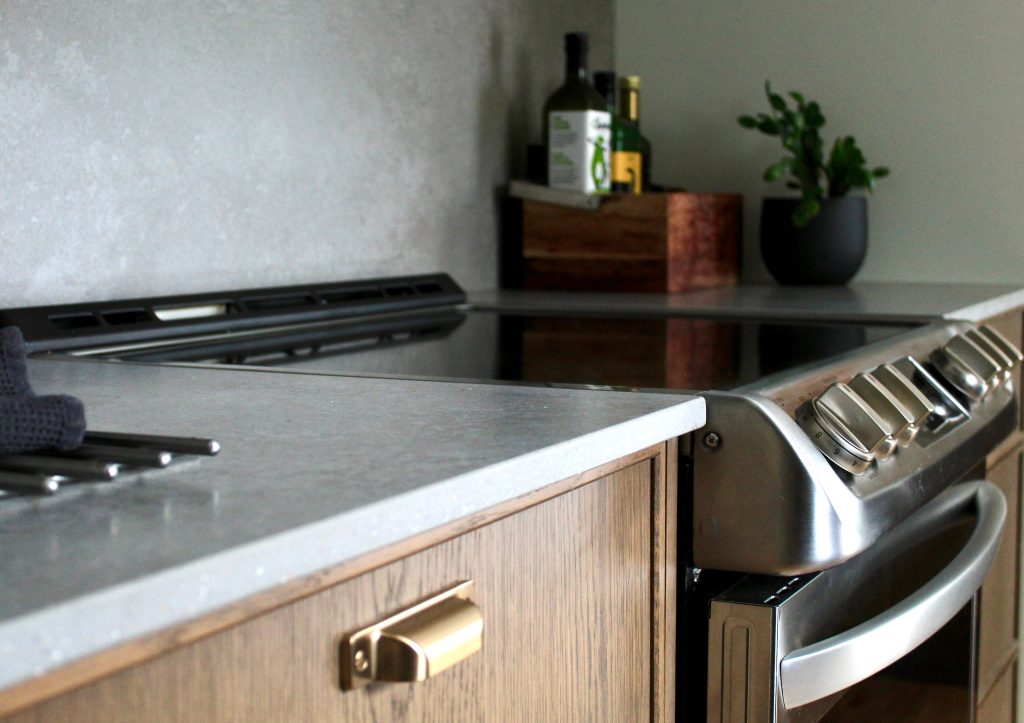
3. Consider ease of maintenance
Countertop maintenance is a crucial aspect of selection for many families. Some materials require regular maintenance, while others are easier to preserve. Porous surfaces like marble can be particularly susceptible to stains, while materials like quartz are renowned for their resistance and easy maintenance. Opt for a surface that matches your use of the space, whether you’re a seasoned cook or more a fan of delivered dishes.
4. Evaluate durability
Will your kitchen be a place for socializing and activity? Do you have children or pets? How long do you expect to keep your kitchen decor? It’s essential to ask yourself these kinds of questions in order to assess your needs in terms of desired durability. Resistance to stains and scratches is a factor to consider when making an informed choice. It’s also important to choose a material that can withstand heat, especially around cooking areas.
5. Explore popular materials
granite
Granite is one of the most popular choices for kitchen countertops because of its exceptional durability, scratch resistance and wide range of colors and patterns. It is also heat-resistant, making it suitable for high-use areas. It is easy to clean with mild soap and water, and can also be sealed to increase its resistance to stains.
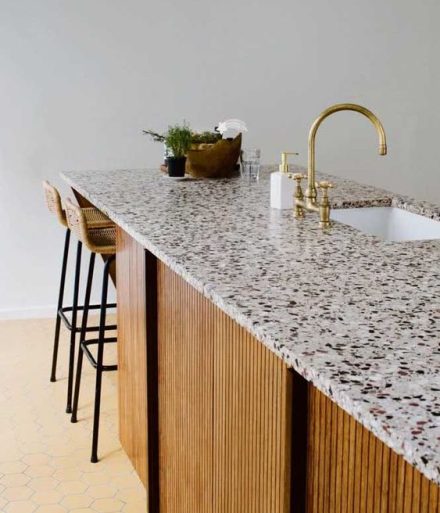
Marble
Marble is renowned for its elegance and luxurious appearance. It offers a range of unique natural colors and veins that lend incomparable charm to any kitchen. Although not totally invulnerable to heat, marble can tolerate high temperatures better than other materials. However, its porous surface can be susceptible to staining, especially if not properly sealed. Acidic liquids such as lemon juice, vinegar or wine can leave stains that are difficult to remove. It therefore requires regular maintenance and special attention on a daily basis to preserve its beauty.
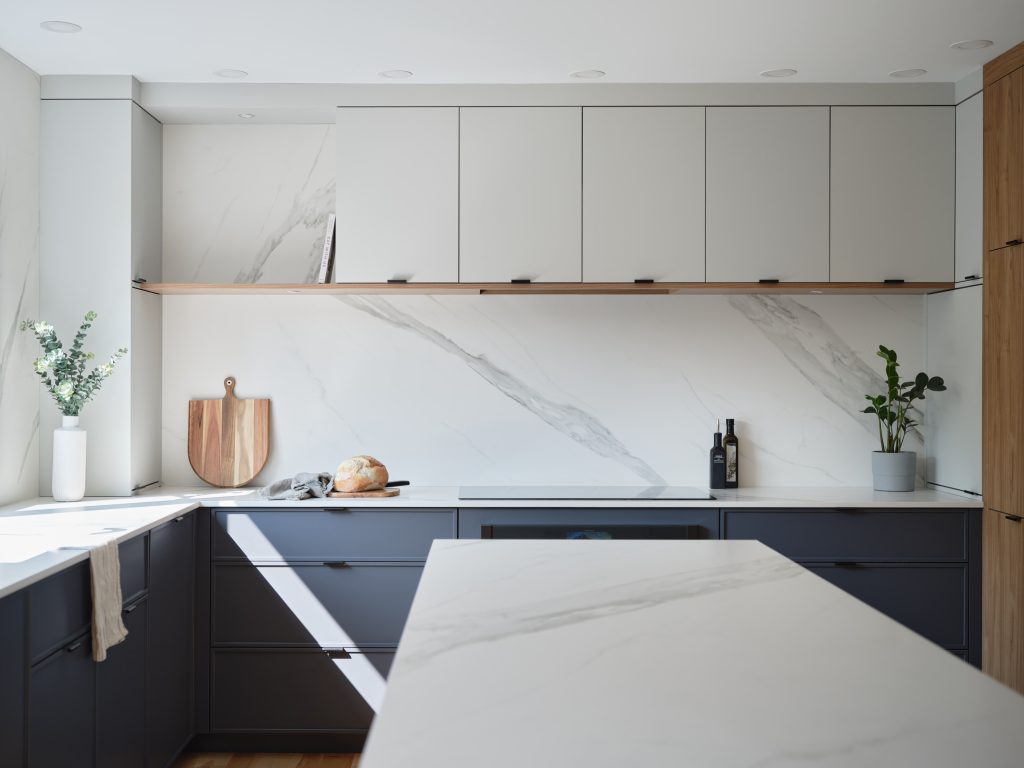
quartz
Quartz is an increasingly popular material for kitchen countertops, thanks to its versatility, durability and stain resistance. Unlike quartzite (a natural rock), quartz for countertops is made by blending approximately 90-95% natural quartz with polymer resins and color pigments. It is highly resistant to scratching, staining and shocks, making it suitable for high-traffic kitchens. Being non-porous, quartz is easy to clean and resistant to bacterial growth, making it a hygienic surface for food preparation. Although it has moderate heat resistance, very hot objects placed directly on the surface can cause damage.
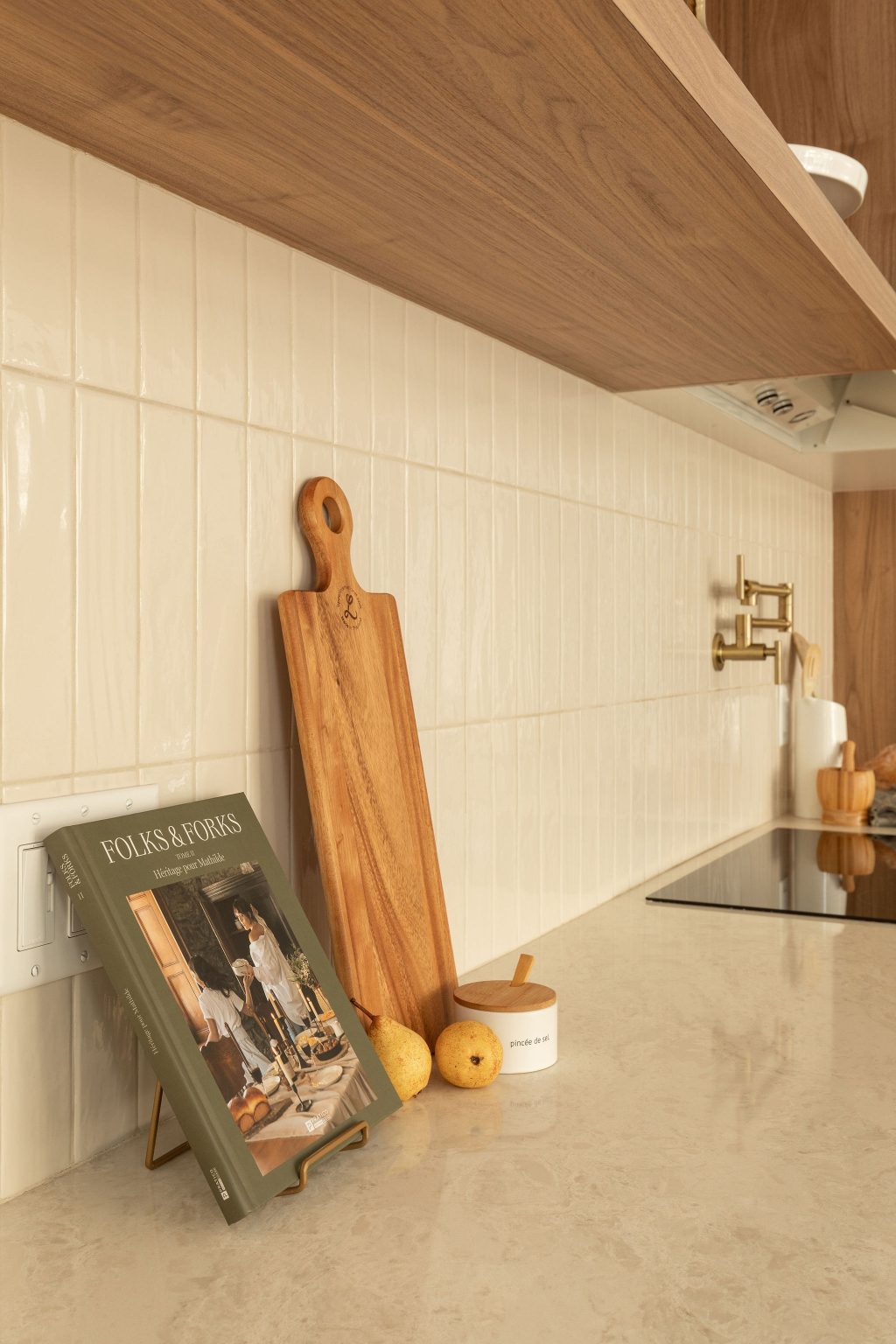
Tip: Not all quartz is created equal! The more resin a quartz contains, the less resistant it will be. Make sure you choose a quality material to benefit from all its advantages.
Concrete
Concrete has become an attractive option for kitchen countertops because of its modern look, versatility and customizability. Unlike other, more traditional materials, concrete is a site-built material, allowing a variety of finishes, colors and textures suited to a wide range of kitchen styles. It can be custom cast to suit unique designs, including integrated drains, molded sinks and more. Although strong, concrete can crack over time, especially if not properly installed or sealed. It’s also important to consider that it’s a particularly heavy material, so structural reinforcements may be required to support it.
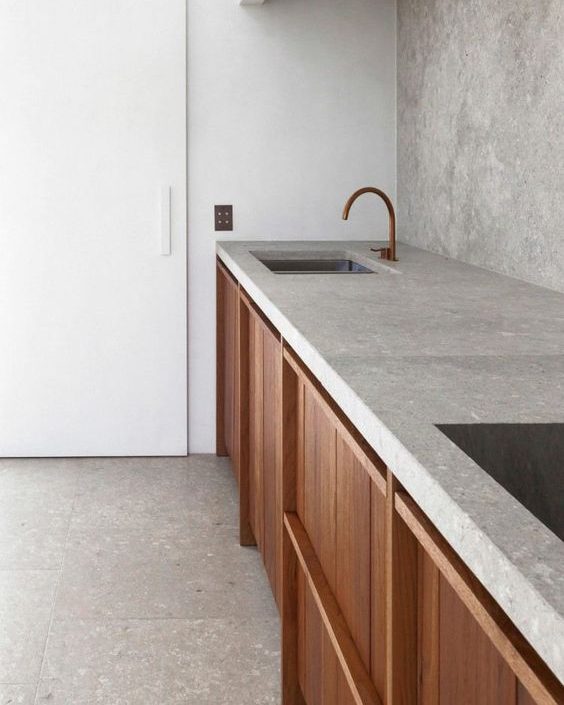 Source : Pinterest
Source : Pinterest
Wooden countertops
Wooden kitchen countertops offer warm aesthetics and design versatility, but they require regular maintenance to preserve their beauty and durability. Wood’s repairability is appreciated when it comes to sanding away scratches and nicks to restore its surface. However, it remains a sensitive material that can warp, stain or crack if exposed to standing water or excessive heat. Wood therefore requires regular maintenance, including sealing, sanding and varnishing to prevent damage.
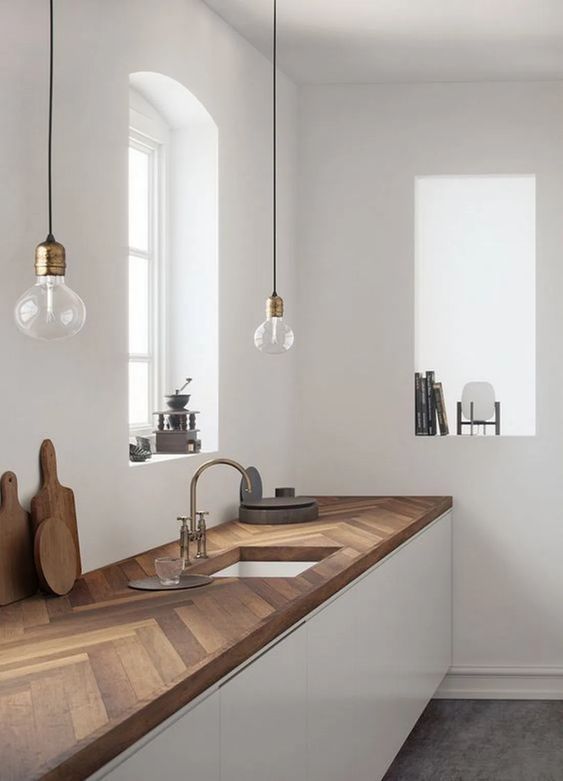 Source : Pinterest
Source : Pinterest
Laminate
Laminate is a popular and affordable kitchen countertop material, widely used for its versatility, variety of colors and patterns, and ease of maintenance. Manufactured by pressing together layers of resin-impregnated kraft paper under high pressure, laminate is covered with a decorative top layer, often imitating the appearance of wood, stone or other materials. Although very affordable, laminate is not very resistant to scratches, heat and can be damaged by standing water or leaks. It is therefore less durable than other materials and can degrade more quickly, eventually requiring more frequent replacement.
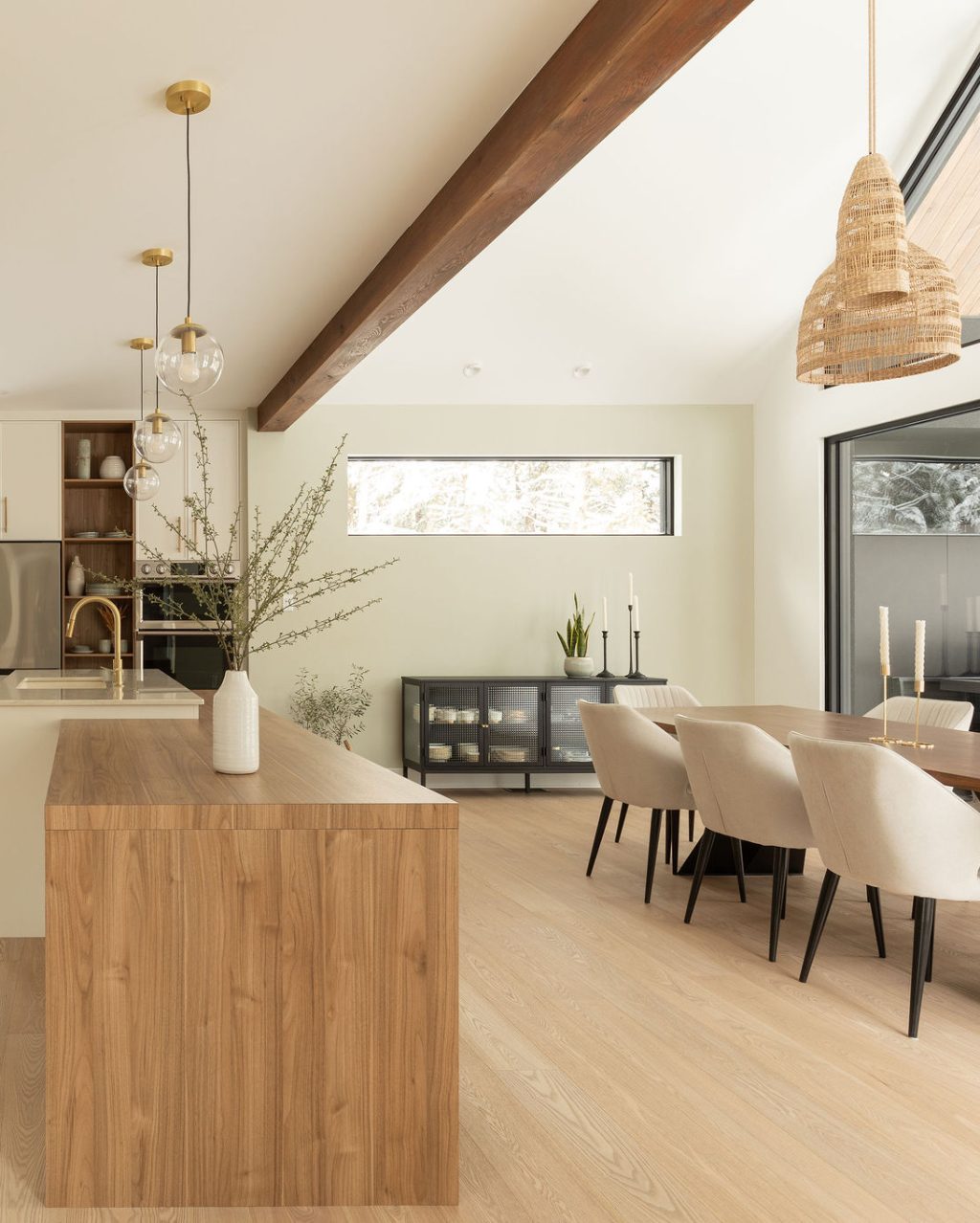
There’s no shortage of options when it comes to choosing the right kitchen countertop. Each material has unique advantages and disadvantages, so it’s essential to consider your needs as well as the specific characteristics of the materials to ensure that your choice suits your lifestyle and aesthetic preferences. Don’t hesitate to call on a kitchen designer to assist you in this task!
